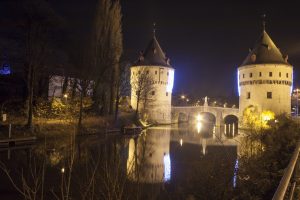
© Colourbox
Aim and Scope
The temporary working experience (TWE) in Flanders is an example of a policy instrument introduced to activate long-term unemployed people. Activation instruments in Flanders are mainly coordinated by the Flemish public employment service (PES), which also is responsible for the TWE service design. The Flemish PES collaborated with the Flemish Association of Cities and Municipalities to design the temporary working experience. Compared to the old article, which is still the legal basis of the TWE, the TWE aims to be more holistic, and provide unemployed people receiving social assistance with a trajectory that aims to reduce their distance to the regular labour market. In this trajectory, unemployed people can gather experience and competencies (Vlaams Parlement, 2016).
Forms of collaboration
The collaboration for the service delivery of the TWE-trajectory is complex and involves different private and public organizations on multiple policy levels. The process of an eventual TWE-trajectory starts when a person presents himself/herself at the public welfare centre in his/her municipality to receive social assistance. A civil servant, often a social worker, then assesses if the new client is ready for an employment in a TWE-trajectory. This step is crucial, as the civil servant has to make an estimation of the client’s potential and needs to decide if the client is perceived to be ready to be employed in the TWE-trajectory that should end with an employment in the regular economic circuit. The civil servant screening the client is in a position with substantial discretionary power. This is necessary due to complexity of such assessment - a decision needs to be tailor-made, and take the social situation of the client into account. When the actual TWE-trajectory starts, one personal counsellor is tasked with the guidance and support of the client throughout the whole trajectory (Doucet, 2020). In the next step, the client is employed in a workplace under an article 60 contract. When problems occur during the employment, it is the personal counsellor who mediates between the client and the workplace. When there is a conflict between the client and the local welfare centre, the Flemish PES will mediate between the two. Operationally the local politicians influence is quite small, but policy objectives and plans can be implemented in a more strategic way that has an impact on use and implementation of the TWE. The Flemish PES is also an important actor that is not directly involved in the guidance of the client but has a large influence on the collaboration as the designer of the TWE as an activation instrument.
ICT features
ICT plays an important role in the collaboration and the accountability mechanisms, primarily for accounts given from public welfare centres to the PES. In Courtrai, two separate platforms are used by the public welfare centre: First, the myCareer-platform, designed by the Flemish PES and used for all the PES’s services. Second, Courtrai has adopted a separate platform for internal communication and collaboration called New Horizon.
Implications
Accountability and legitimacy effects
The TWE is an activation instrument designed and partly funded by the Flemish PES. However, the PES does not have much leverage to influence the employment in TWE and the counselling of the client. To provide a comprehensive and holistic social assistance, of which activation is an important part, the personal counsellors of public welfare centres have been granted a large discretionary power in the service delivery of TWE. The accounts rendered to the PES are primarily targeted on administrative criteria like the propriety of subsidy payments and the comprehensiveness of registration. This has some consequences for the collaboration, and may be considered illogical as the Flemish PES is the meta-governor of the entire Flemish labour market and has knowledge and expertise that would be very useful in making this decision. This has also led to a large difference between the service delivery of the TWE in different municipalities (De Coen et al., 2018). In these cases, the (lack of) accountability and collaboration mechanisms could inhibit the activation of the target group.
Lessons learned (policy managers and policymakers)
Most of the respondents perceived that the collaboration is rather successful and that the TWE does have a more activating effect than just the article 60 employment as well as being a step forward in a holistic activation policy. However, they also mentioned that the framework of the TWE is too rigid and often is not suited for the complex situation of the clients. Furthermore, the transfer from the local welfare centre’s personal guidance to the Flemish PES’ instruments does not always work well. This has two main reasons. First, the personal counsellors of the local welfare centres are not very familiar with the instruments that the Flemish PES offers to those who have finished their TWE. Second, there is insufficient information exchange between the Flemish PES and the local social welfare centres. An evaluation of the new TWE instrument in 2018 has similar conclusions, stating that the local welfare centres have problems with understanding and using the instruments of the Flemish PES and that there are some troubles with the exchange of information and instructions on these instruments (De Coen et al., 2018, pp. 56-62).
To read more about the case study, see D8.1 Networks of account-giving in long-term unemployment collaborations in five countries report.
Further materials/sources
de Coen, A., Valsamis, D., & Vanoeteren, V. (2018). Activering van leefloongerechtigden via tijdelijke werkervaring. Retrieved from Brussel. https://www.vlaanderen.be/publicaties/activering-van-leefloongerechtigden-via-tijdelijke-werkervaring
Doucet, C. (2020). Draaiboek Tijdelijke Werkervaring OCMW. Retrieved from https://www.vdab.be/sites/web/files/doc/partners/tijdelijkewerkervaring/draaiboek-TWE-OCMW-Deel1.pdf
About the Authors
Dries Van Doninck, University of Antwerp
Jan Boon, University of Antwerp
Koen Verhoest, University of Antwerp
